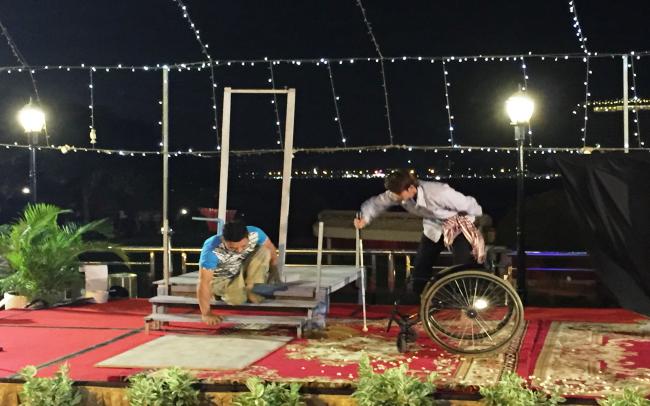A group of gifted local performers with different disabilities made us realise that going to the toilet is not as easy for everyone as you might think.
Published on: 21/03/2016
We concluded the regional learning event with a proper Cambodian style cultural show and dinner. A group of gifted local performers with different disabilities made us realise that going to the toilet is not as easy for everyone as you might think.
The fourth and final day of the regional learning event on sustainability organised by the Ministry of Rural Development and SNV Asia in Cambodia concluded yesterday afternoon with a formal closure chaired by the H.E. Mr. Chea Sophara, the Minister of Rural Development in Cambodia. It was a busy final day in which some big topics were discussed, leaving the most inspiring topic till the very end: the dinner and cultural show in the evening. Apart from great food and beautifully choreographed traditional Cambodian dances, we witnessed a daring and at times extremely witty sanitation inspired drama performed by a local group of artists called Epic Arts Cambodia.

Drama and slapstick were used to drive the message home that toilets are a human right, not just for the abled but equally so for the disabled among us. Although funny to watch, it was a real eye opener to see how an elderly person, a pregnant woman and a handsome young man in a wheelchair were struggling to get into a "normal" toilet and then try to use it. Where can they go if they need to poo or pee when at work, at school, visiting a government office or a friend? In most of these places nowhere! They also used a "talking toilet" to re-emphasise their message. Just imagine if only toilets could talk. They would be able to share all sorts of stories with us. Some nice, some funny and some disgusting. But they would also be able to tell us that they had not been able to provide a comfortable experience for all their visitors. For the simple reason that they had been designed and constructed with only abled persons in mind.
On UNICEF's website I found the following: "Access to safe and clean water and sanitation facilities is a basic right of all people, including people with disabilities, the denial of which can have serious implications on their well-being. For example, inaccessible toilet and water facilities are major contributing factors for school dropout among children with disabilities, especially girls." The Inclusive WASH website states that "People with a disability represent the largest socially excluded group globally and most live without access to basic sanitary services, which can exacerbate impairments and poverty."
You may ask: didn't you know? I want to believe that I am not stupid, so I would say I know. Everyone knows. But as sanitation practitioners we know that understanding and knowing does not automatically translate into action. There is plenty of evidence which proves that uptake of sanitation facilities does not increase rapidly after demand for it has been created, for example through CLTS triggering. I guess it is the same for us. Understanding that there is a problem does not mean that we think of it each and every day when we are working to find answers and solutions for the sanitation and hygiene related challenges. Sometimes you need a smack in the face by Epic Art or anyone else to make you realise that the global Strategic Development Goals (SDGs) for water and sanitation cannot be achieved unless we consider every human being on this planet. Achieving universal access to water, sanitation and hygiene services by 2030 means that we need to consider the specific needs, wants and aspirations of the elderly, the pregnant, the sick, people with a disability and many others.
Thanks guys for a brilliant performance and for giving me a timely wake up call...
Thanks to the Ministry of Rural Development of Cambodia, SNV Asia but in particular to the SNV Cambodia WASH team for a brilliantly organised and inspiring learning event.
Epic Arts is a grassroots non-profit organisation that promotes collaboration and community development through the arts. Since 1997, they have been working to build community partnerships, mobilise local artists, produce cultural events, and develop resources and facilities that ensure accessibility for artists, performers and audiences. For more information check out the Epic Arts website.
In Cambodia WaterAid is collaborating with Epic Arts Cambodia. The sanitation related drama is a tangible outcome of that successful collaboration. For further information visit the WaterAid Cambodia website.
If you need a happiness boost then watch the following video below from Epic Arts Cambodia.
Leave No One Behind: Voices of Women, Adolescent Girls, Elderly and Disabled People, and Sanitation Workers. "Leave No One Behind" summarises the sanitation and hygiene hopes and aspirations of thousands of women and men of different ages and physical ability, across rural and urban areas in eight South Asian countries.
At IRC we have strong opinions and we value honest and frank discussion, so you won't be surprised to hear that not all the opinions on this site represent our official policy.